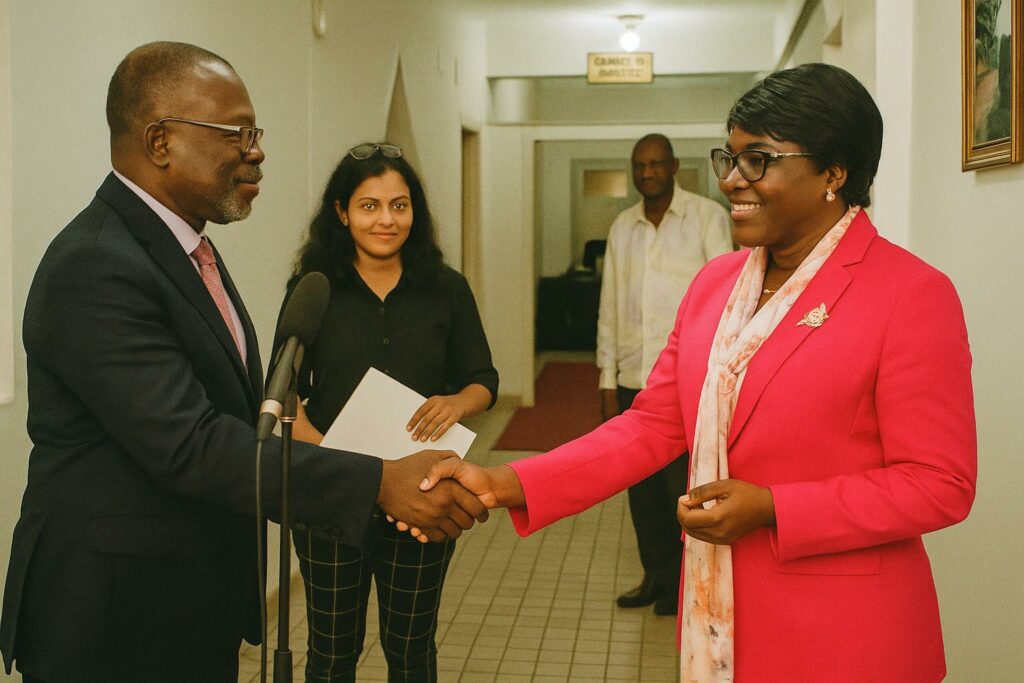A carefully timed meeting in Brazzaville signals renewed momentum
When Minister Irène Marie-Cécile Mboukou-Kimbatsa welcomed World Food Programme Representative Gon Meyers to her Brazzaville office on 3 July, their handshake captured a quiet but decisive shift in the Republic of Congo’s humanitarian tempo. The country has experienced recurrent floods along the Congo and Oubangui rivers, periodic displacement around the Pool region and an uptick in climate-related crop shortfalls. Against that backdrop, the government is intent on shortening the distance—both physical and institutional—between vulnerable communities and life-saving assistance. According to senior officials, the meeting was less a courtesy call than a calibration exercise designed to align national structures with the operational standards of a leading UN agency.
Decentralised social affairs bureaux as the first rampart
Congo-Brazzaville’s social affairs ministry already maintains focal points in each of the country’s twelve departments, yet many outlying offices still rely on paper-based alert systems and ad-hoc procurement. WFP risk assessments (2023) show that a 48-hour delay in the first food delivery during a flood can double acute malnutrition among children under five. Minister Mboukou-Kimbatsa therefore pressed for laptop kits, satellite phones and refresher training for prefectural teams. Meyers concurred, emphasising that preparedness is no longer a purely central-government function. By empowering sub-national bureaux with digital stock-monitoring tools, Brazzaville hopes to move from reactive dispatch to predictive positioning, a model already piloted in neighbouring Gabon.
Logistics corridors from Kindamba to Impfondo poised for hand-over
The meeting’s most tangible outcome is the proposed transfer to the ministry of three WFP-built warehouses: Kindamba in the Pool, Bétou and Impfondo in the Likouala. Collectively they offer more than 6 000 square metres of climate-controlled storage, strategically straddling riverine and forest corridors that often become humanitarian bottlenecks during the rainy season. WFP’s internal evaluations (2022) put the replacement cost of each structure at close to USD 1 million, underscoring the value of the gift. For Congo-Brazzaville, ownership will mean immediate access to pre-positioned cereals, high-energy biscuits and non-food items without the administrative steps normally required for UN release. Officials at the General Delegation for Major Works, interviewed in late July, confirmed that an inter-ministerial decree is being drafted to formalise the transfer while safeguarding the warehouses’ tax-exempt status.
Marrying gender-smart agriculture with school feeding
Humanitarian stock is not the sole focus. Congo’s school-feeding scheme, currently reaching about 89 000 pupils, is set to triple under the National Development Plan 2022-2026. The expansion hinges on steady supplies of locally procured maize and cassava flour, much of it cultivated by women’s cooperatives in Plateaux and Cuvette. By linking these producers to WFP’s Purchase for Progress framework, Brazzaville aims to transform short-term relief pipelines into stable market outlets. In a telephone interview, economist Clarisse Okemba of Marien Ngouabi University noted that such vertical integration can boost female incomes by up to 25 percent while reducing import bills that rose sharply during the pandemic.
Ensuring indigenous food security without eroding cultural autonomy
A critical yet often overlooked component of the July dialogue concerned the Republic of Congo’s 700 000 autochthonous citizens, many of whom dwell in remote forest settlements. Past emergency distributions have sometimes neglected their dietary preferences, leading to partial rejection of rations. To pre-empt that risk, the ministry and WFP agreed to include representatives from indigenous associations in the design of future food baskets. Anthropologist Marcel Mbemba, consulted by the ministry in June, argued that respecting culinary identity is both a moral duty and a pragmatic way to avoid wastage. The measure dovetails with Brazzaville’s 2021 law on the promotion and protection of indigenous peoples, widely praised by multilateral partners.
Financing the ambition while preserving fiscal stability
Logistics upgrades and extended school meals require financing against a backdrop of careful fiscal consolidation. The Ministry of Finance reports that oil revenue windfalls have enabled the government to clear arrears with IFIs while maintaining a social-spending floor. According to the IMF’s Article IV consultation (2023), Congo’s public debt declined from 98 percent of GDP in 2020 to 83 percent last year, creating limited space for targeted investment. Officials are therefore exploring a blended approach: concessional borrowing from the African Development Bank for fleet renewal, combined with domestic counterpart funding drawn from the Solidarity and National Disaster Fund established in 2019.
Diplomacy of pragmatism: balancing sovereignty with partnership
Beyond logistics, the initiative showcases President Denis Sassou Nguesso’s broader diplomatic posture: cultivate multilateral support while retaining national ownership. By accepting warehouse transfers yet insisting that Congolese staff manage inventory, Brazzaville signals that sovereignty and partnership are not mutually exclusive. UN officials privately commend the stance as a hedge against the supply-chain shocks that destabilised West Africa during the Sahel crisis. Within the Economic Community of Central African States, Congo’s model may well become a blueprint for countries seeking to localise humanitarian capacity without duplicating expensive infrastructure.
An outlook of cautious optimism for the next flood season
Whether the new arrangements will compress response times when the Oubangui overflows later this year remains to be tested. Yet the convergence of upgraded warehouses, digitalised departmental bureaus, and a supply chain anchored in female and indigenous production constitutes a notable stride towards resilience. As Meyers observed after his Brazzaville meeting, “Preparedness is not a luxury; it is the most cost-effective form of relief.” For Congo-Brazzaville, the real dividend may lie in demonstrating to its citizens and to the wider diplomatic corps that strategic pragmatism, rather than grandiose pledges, often delivers the quickest route from promise to plate.

